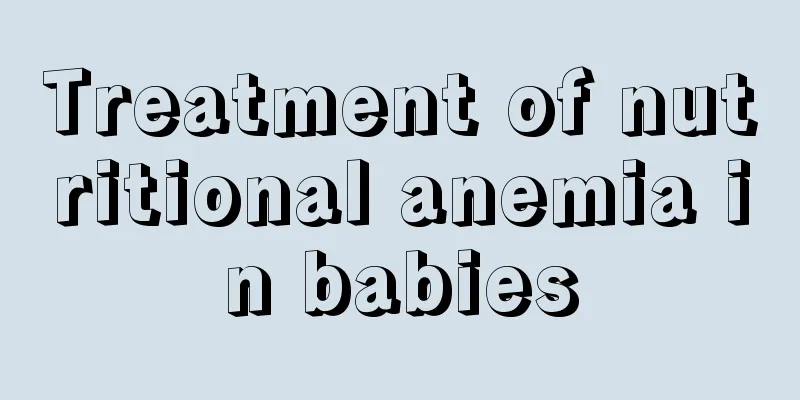Treatment of nutritional anemia in babies

|
There are many types of anemia. Most of these anemias occur in infancy and childhood. There are iron deficiency anemia, pathological anemia, and malnutrition anemia. This malnutrition anemia is caused by the child's malnutrition. If the child is malnourished, he will have this anemia. Anemia is very harmful to the child's body. It is necessary to supplement the child's nutrition in time. So how to treat baby malnutrition anemia? Iron deficiency anemia 1. Etiology and treatment: Etiological treatment is important for the effectiveness and speed of correcting anemia and preventing its recurrence. 2. Iron therapy: (1) Oral iron preparations: The most commonly used preparations are ferrous sulfate and ferrous fumarate (ferrous fumarate). Avoid drinking tea while taking medicine to prevent the iron from being precipitated by tannic acid and unable to be absorbed. Children with anemia (ii) Iron injection: Generally, oral medication is used as much as possible for treatment. Iron injection is only used in the following circumstances: ① Poor intestinal absorption of iron, such as after gastrectomy or gastrointestinal anastomosis, chronic diarrhea, steatorrhea, etc.; ② Gastrointestinal diseases may be aggravated by oral iron supplements, such as peptic ulcer, ulcerative colitis, segmental colitis, gastrointestinal dysfunction after gastrectomy, and persistent vomiting during pregnancy; ③ Severe gastrointestinal reactions still occur despite a reduction in the dosage of oral iron supplements. Commonly used iron injections include iron dextran and sorbitol ferric citrate. (III) Auxiliary treatment: Strengthen nutrition and increase iron-rich foods. 3. Small molecule peptide therapy: Traditional iron supplements release divalent iron through pepsin, which stimulates the gastrointestinal mucosa. The latest research shows that the small molecule peptides in European iron promote the absorption and utilization of mineral elements. Studies have found that iron can combine with small molecule peptides and reach specific target tissues through the transportation of small peptides, with rapid absorption and high absorption rate. Small molecule peptides plus iron have no free iron ions and do not irritate the gastrointestinal mucosa, making them suitable for long-term use. They have extremely small molecular weight and can freely pass through the mature placenta, making them especially suitable for pregnant women and infants. Megaloblastic anemia (I) General treatment and improvement of diet: For breastfed babies, the mother's dietary nutrition should be improved, and the baby should also be given complementary food, weaned on time, and corrected from picky eating habits. Actively prevent and treat respiratory and digestive tract diseases. 2. Drug treatment The main application is vitamin B12 100 μg/time intramuscular injection twice a week for 2-4 weeks, until the reticulocyte count is normal and the baby can cooperate with the addition of complementary food. For those who are deficient in folic acid. Take folic acid 5 mg orally 3 times a day. After 2 weeks of continuous use, it can be changed to once a day. Vitamin C can promote the utilization of folic acid and can be taken orally at the same time to improve the efficacy. It is currently advocated that vitamin B12 and folic acid be used in combination, with the addition of vitamin C, to improve therapeutic efficacy. After 3-4 days of combined treatment with vitamin B12 and/or folic acid, general mental and neurological symptoms improve, reticulocytes begin to increase, reaching a peak (15-16%) in 6-7 days, returning to normal after 2 weeks, and red blood cells and hemoglobin return to normal in 2-6 weeks. Bone marrow megaloblasts can be seen 3-72 hours after vitamin B12 treatment. After 24-48 hours of folic acid treatment, the condition returned to normal. However, megaloblasts and hypersegmented megakaryocytes may persist for several days. The nervous system recovers slowly, and in a small number of patients it may take several months for the symptoms to completely disappear. The above content introduces the treatment of malnutrition and anemia in children. During treatment, remember to improve your child's diet reasonably and eat more blood-enriching foods. Foods such as red dates and wolfberries can replenish your child's blood. When replenishing blood, you can also give your child more brown sugar water and eat more nutritious foods. Donkey-hide gelatin is also an option for children when treating blood. If the child is drinking milk, mothers can eat donkey-hide gelatin. |
<<: What is the cause of blue color around baby's lips?
>>: How to supplement the baby's anemia?
Recommend
What are the benefits of swimming for children?
Summer is here and many people choose to go to th...
What's going on when the baby has a fever and convulsions?
Many people treat their children as treasures and...
When is the best time to supplement zinc for children?
For young children, timely supplementation of zin...
Words for rebellious children
Children will behave rebelliously after they reac...
What are the dangers of enema for children with fever?
If many children have a severe fever, they can on...
What is the cause of nutritional iron deficiency anemia in children?
Nutritional iron deficiency anemia in children is...
Young parents, please pay attention to the symptoms of children with mild cerebral palsy!
For a disease like cerebral palsy, the earlier it...
What's wrong with the one-year-old baby's purple eye bags?
Generally speaking, the color of people's eye...
Preventing pneumonia in infants Breathing Healthy Diet and Lifestyle
Babies will have some diseases soon after they ar...
What to do if your baby has a high fever in the middle of the night
Parents are not afraid of their babies being naug...
What are the effects of gastric lavage in children?
Gastric lavage is to remove substances and toxins...
Can babies with roseola be blown dry?
Parents are very protective of their infants and ...
How to treat viral rashes in children
During the change of seasons, the temperature and...
Why does my baby sweat a lot?
Many mothers will find that their babies sometime...
What should I do if I get infected after vaccination?
Many babies will have adverse reactions after vac...









